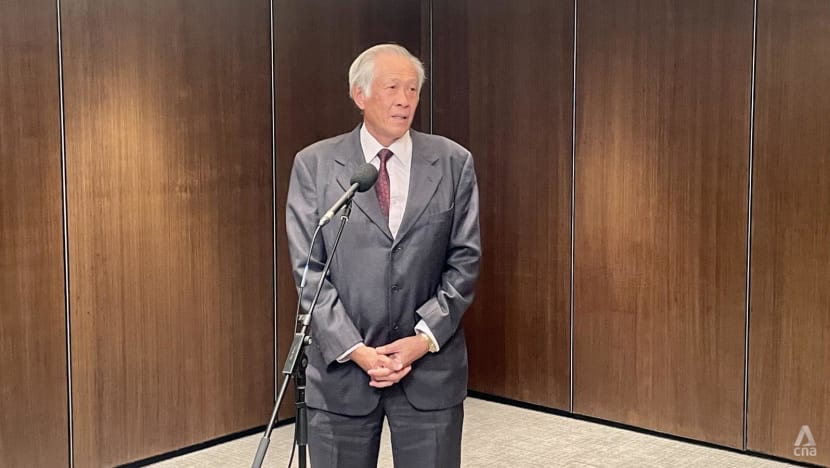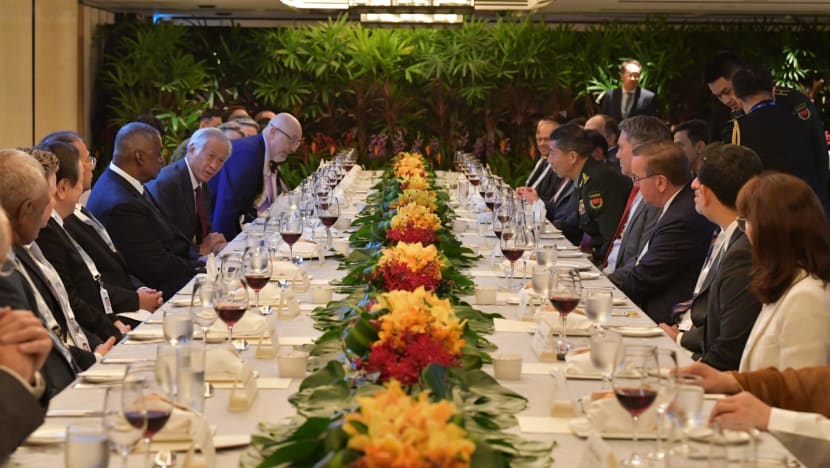Simultaneous war in Europe and Asia will be ‘catastrophic’, says Ng Eng Hen
On the second day of the Shangri-La Dialogue, Singapore's defence minister said that he is hopeful China and the US will resume physical meetings.

Singapore's Defence Minister Ng Eng Hen speaking to the media at the Shangri-La Dialogue on Jun 3, 2023. (Photo: CNA/Louisa Tang)
SINGAPORE: War erupting in Europe and Asia at the same time will prove “catastrophic”, Singapore’s Defence Minister Ng Eng Hen said on Saturday (Jun 3) as he gave his take on how relations between the United States and China have been progressing.
“I think there was – because of what’s happening in Ukraine – understanding, and I think this applies to all ministers, the price of conflict and war,” Dr Ng told reporters at a doorstop interview at the Shangri-La Dialogue, Asia's top defence summit.
“And, you just have to trust me on this, but there was a real sincerity and urgency that what happened in Ukraine must not happen in Asia because as many ministers have said, if you have simultaneous war in Europe and Asia, it’s catastrophic," he added.
This came as United States Defense Secretary Lloyd Austin said in a speech at the summit on Saturday morning that he was “deeply concerned” about China’s unwillingness to engage in military crisis management.
Related:
The relationship between the US and China is at its lowest point in years, as they remain deeply divided over issues like Taiwan to espionage and territorial disputes in the South China Sea.
Last October, Chinese President Xi Jinping said that China would never renounce the right to use force over Taiwan.
Tensions between Beijing and Taipei have risen dramatically after China staged war games near Taiwan last August following then-US house speaker Nancy Pelosi’s visit to the island.
War erupting in Europe and Asia at the same time will prove “catastrophic”, Singapore’s Defence Minister Ng Eng Hen said on Saturday (Jun 3) as he gave his take on how relations between the United States and China have been progressing at a doorstop interview at the Shangri-La Dialogue, Asia's top defence summit. Alif Amsyar with more.
Earlier this week, China's Minister of National Defence Li Shangfu declined an invitation to meet Mr Austin at the Shangri-La Dialogue. On Friday, they shook hands on the sidelines of the summit but did not hold detailed talks, the Pentagon said.
General Li, who was sanctioned by the US in 2018 and who was named defence minister in March, will deliver his speech at the Shangri-La Dialogue on Sunday.
Mr Austin said a “cordial handshake over dinner” was “no substitute for a substantive agreement”, adding that the US does not “seek conflict or confrontation” but will not stand for any “coercion and bullying” of its allies and partners by China.

HOPEFUL THAT US, CHINA RESUME PHYSICAL MEETINGS
On Saturday afternoon, Dr Ng expressed his hope that American and Chinese defence leaders would resume their physical meetings.
He told reporters that both sides had talked to him independently and that he could share the US and China want a resumption, but Singapore would leave it to them as to when and how that can be done.
Dr Ng had been asked for his views on the prospects of further US-China talks, especially during a roundtable he hosted with 29 visiting ministers and their representatives right before the doorstop interview.
Singapore's defence ministry said in a news release that the ministers discussed a "wide range of issues", including the impact of US-China relations on the Asia region.
Dr Ng noted that Singapore was not in a position to comment on diplomatic relations between other countries. “But from what they have said publicly, they do want open lines of communication," he added.
"Nobody has said, ‘I don't want to talk’. They may have said, 'Well, there are preconditions that have not been satisfied.' But that's very different.
“And I will say this: No military leader that I've met with … ever feels comfortable if they can't talk to another counterpart. It's a risk. It's not an asset."
Dr Ng pointed out that part of the Shangri-La Dialogue is the “priceless and almost non-substitutable element” of “maybe five to 10 minutes of just meeting each other and the interchange, knowing your body language, knowing what you like, what you don’t like”.
“That’s priceless in terms of picking up a phone and saying, ‘Hey, we met with so-and-so, do you remember?’ I’ve seen it happen here,” he added.
“Suddenly they share about what they experienced and the common aspects, so these relationships are very important.”
As for what has been achieved thus far at the summit in terms of easing tensions between US and China, Dr Ng said that “everyone is concerned”, especially Mr Austin.
“As he openly said during his plenary session: You need to have lines of communication among friends, and I would argue particularly among adversaries,” Dr Ng added.
"That's been shown again and again because even if you go into conflict, you want to be able to pick up the phone and say, look, we have this situation, how do we de-escalate it because it's either not worth it or you know, it's not within our objectives?”
Dr Ng said that even though China and the US have not formally called on each other, they met at the Shangri-La Dialogue, “sat at the same table last night, sat across each other at lunch (on Saturday) and heard each other speak”.
“Get a measure of the man, the thinking, the proclivities, the temperament – hopefully, it’ll add to their databank when they do finally engage,” he added.
Dr Ng also addressed a question on whether the fact that an American warship is currently transiting through the Taiwan Strait is undercutting efforts to establish open lines of communication between the US and China.
He said that each country wants to follow international law but may have “slightly different interpretations” of it.
“Your question is, how can you talk about peace but behave in a way which might be provocative to the other party? Well, this is the reality. That's why we're here to talk,” he added.
“But I would say that commitment and realisation that conflict in Asia will be devastating overwrites all this. It's not only from the language they speak, it's with the conviction when they speak, things that really reflect your true feelings.
“That gives me the conviction and the optimism that defence ministers know the price of war. We are doing as much as we can to avoid it."















